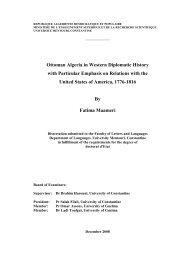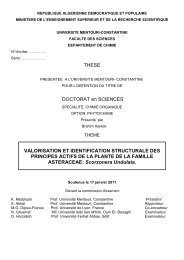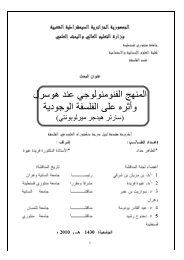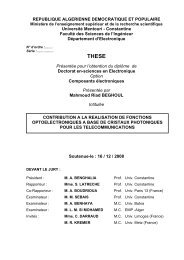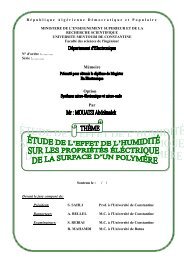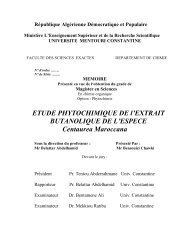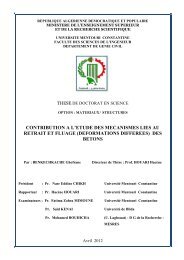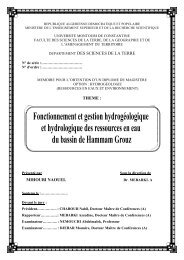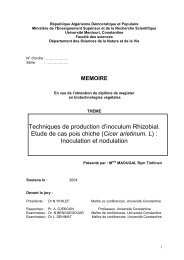(Thèse partie 1)
(Thèse partie 1)
(Thèse partie 1)
Create successful ePaper yourself
Turn your PDF publications into a flip-book with our unique Google optimized e-Paper software.
191<br />
Références bibliographiques<br />
Valderrama, M. J., Quesada, E., Bejar, V., Ventosa, A., Gutierrez, F., Ruiz-Berraquero,<br />
F. & Ramos-Cormenzana, A. (1991). Delaya salina sp. nov., a moderately halophilc gramnegative<br />
bacterium. Int Syst JBacteriol 41, 377-384.<br />
Ventosa, A. (1988). Taxonomy of moderately halophilic heterotrophic eubacteria. In<br />
Halophilic Bacteria. Ed. F. Rodriguez-Valera. pp. 71-84. CRC Press, Boca Raton Florida.<br />
Ventosa, A., Gutierrez, C., Garcia, M. T. & Ruiz-Berraquero, F. (1989). Classification of<br />
Chromohalobacter marismortui in a new genus, Chromohalobacter gen. nov., as<br />
Chromohalobacter marismortui comb. nov., nom. rev. Int J Syst Bacteriol 39, 382-386.<br />
Ventosa, A., Marquez, M. C., Ruiz-Berraquero, F. & Kocur, M. (1990). Salinicoccus<br />
reseus gen. nov., sp. nov., a new medrately halophilic Gram-positive coccus. Syst Appl<br />
Microbiol 13, 29-33.<br />
Ventosa, A., Marquez, M. C., Weiss, N. & Tindall, B. J. (1992). Transfer of Marinococcus<br />
hispanicus to the genus Salinicoccus as Salinicoccus hispanicus comb. nov. Syst Appl<br />
Microbiol 15, 29-33.<br />
Ventosa, A. & Nieto, J. J. (1995). Biotechnological applications and potentialities of<br />
halophilic microorganisms. World J Microbiol Biotechnol 11, 85-94.<br />
Ventosa, A., Nieto, J. J. & Oren, A. (1998). Biology of aerobic moderately halophilic<br />
bacteria. Microbial Mol Biol Rev 62, 504-54.<br />
Ventosa, A., Gutierrez, M. C., Kamekura, M. & Dyall-Smith, M/ L. (1999). Proposal to<br />
transfer Halococcus turkmenicus, Halobacterium trapanicum JCM 9743 and strain GSL-11 to<br />
Haloterrigena turkmenica gen. nov., comb. nov. Int J Syst Bacteriol 49, 131-136.<br />
Ventosa, A., Gutiérrez, M. C., Kamekura, M., Zvyagintseva, I., S. & Oren, A. (2004).<br />
Taxonomic study of Halorubrum distributum and proposal of Halorubrum terrestre sp. nov.<br />
Int J Syst Evol Microbiol 54, 389-392.<br />
Verhees, C. H., Kengen, S. W. M., Tuininga, J. E., Schut, G. J. & Adams M. W. W.<br />
(2003). The unique features of glycolytic pathways in Archaea. Biochem J 375, 231-246.<br />
Visentin, L. P., Chow, C. & Matheson, A. T. (1972). Properties of the Ribosomal Proteins<br />
and Ribonucleic Acid. J Biochem 130, 103-110.<br />
Vreeland, R. H., Litchfield, C. D., Martin, E. L. & Elliot, E. (1980). Halomonas elongata,<br />
a new genus and species of extremely salt-tolerant bacteria. Int J Syst Bacteriol 30, 485-495.<br />
Vreeland, R. H., Mierau, B. D., Litchfield, C. D. & Martin, E. L. (1983). Relationship of<br />
the internal solute composition to the salt tolerance of Halomonas elongata. Can J Microbiol<br />
29, 407-414.<br />
Vreeland, R. H., Anderson, R. & Murray, R. G. E. (1984). Cell wall and phospholipid<br />
composition and their contribution to the salt tolerance of Halomonas elongata. J Bacteriol<br />
160, 879-883.<br />
Vreeland, R. H., Rosenzweig, W. D. & Powers, D. W. (2000). Isolation of a 250 millionyear-old<br />
halotolerant bacterium from a primary salt crystal. Nature 407, 897-900.<br />
Vreeland, R. H., Straight, S., Krammes, J., Dougherty, K., Rosenzweig, W. D. &<br />
Kamekura, M. (2002). Halosimplex carlsbadense gen. nov., a unique halophilic archaeon,<br />
with three 16S rRNA genes, that grows only in defined medium with glycerol and acetate or<br />
pyruvate. Extremophiles 6, 445-452.<br />
Wainø, M., Tindall, B. J., Schumann, P & Ingvorsen, K. (1998). Gracilibacillus gen. nov.,<br />
with description of Gracilibacillus halotolerans gen. nov., sp. nov., transfer of Bacillus<br />
dipososauri comb. nov., and Bacillus salexigens ro the genus Salibacillus gen. nov.n as<br />
Salibacillus salexigens comb. nov. Int I Syst Microbiol 49, 821-831.



